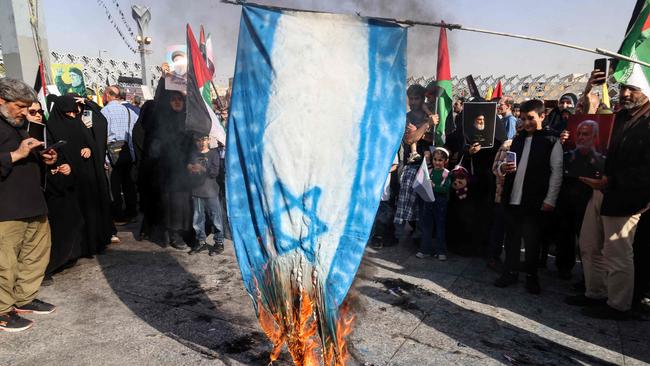Benjamin Netanyahu weighing up the ferocity of Israel’s retaliation against Iran
Israel was weighing the ferocity of its promised retaliation against Iran amid US pressure for a proportionate response to the rogue state’s missile attack that spares its nuclear facilities.

Israel was weighing the ferocity of its promised retaliation against Iran amid US pressure on Thursday for a proportionate response to the rogue state’s missile attack that spares its nuclear facilities.
Israel’s UN ambassador Danny Danon said Israel did not want war with Iran but was preparing a “painful response” that would be “far greater than they could ever have imagined”. Israel has a range of potential options for retaliatory strikes, including an attack on Iran’s oil facilities or nuclear sites – which the regime has long-considered a “red line” – or a more limited assault on military or commercial targets.
US President Joe Biden said Israel had “a right to respond” but Iran’s nuclear facilities should be off-limits. “The answer is ‘no’,” he said, when asked whether the US would support such an attack.
The prospect of a dangerous escalation in Israel’s multi-front war hangs over its calculations after Iran’s attack on Wednesday AEST with some 180 ballistic missiles.
Mr Danon told CNN that Israel “will not sit idly by” following Iran’s brazen attack, and its response was coming “soon”.
“But we would have to make it a calculated response because we don’t want to see full war with Iran,” he said. “And believe me, they also don’t want to see it.
“We have shown our capabilities when we fought Hamas in Gaza, and we are fighting Hezbollah in Lebanon. They better look at what happened in Beirut and Gaza before they start a war with us.”

Iranian President Masoud Pezeshkian said his country was also “not looking for war” but was prepared to strike back if Israel attacked. “If Israel wants to react, we will have a stronger response. This is what the Islamic Republic is committed to,” he said.
The Washington Post reported senior Israeli officials had told US counterparts that the country did not feel the need to mount a “massive” retaliatory attack, but US and European officials feared the Jewish state was looking at striking economic targets that could prompt a fierce response from Tehran.
Some in Israel are pushing for a far-reaching response to deal with the threat posed by the country once and for all.
Former Israeli prime minister Naftali Bennett urged the government to act “now” to destroy Iran’s nuclear program and “fatally cripple this terrorist regime”.
“Israel has the greatest opportunity in 50 years to change the face of the Middle East,” Mr Bennett said. “Now is the time to strike the head of the octopus, otherwise they can recover.”
In an urgent phone hook-up, G7 leaders condemned Iran’s attack on Israel and urged a cautious response. “Expressing strong concern over the escalation in recent hours, it was reiterated that a region-wide conflict is in no one’s interest and that a diplomatic solution is still possible,” the G7 chair, Italian Prime Minister Giorgia Meloni, said in a statement.
UN Secretary General Antonio Guterres – who was banned from entering Israel a day earlier for failing to “unequivocally condemn” Iran’s attack – said “raging fires in the Middle East were fast becoming an inferno”.
“It’s high time to stop the sickening cycle of escalation after escalation that is leading the people of the Middle East straight over the cliff,” he told the UN Security Council.
“This deadly cycle of tit for tat violence must stop.”

In Lebanon on Thursday AEST, Israel carried out what it said were “precise” strikes against Hezbollah targets in Beirut. Lebanese authorities said six people were killed in the bombardment.
Days after Israel launched “targeted ground raids” in Lebanon, its military revealed eight Israeli soldiers had been killed fighting Hezbollah militants there. The IDF said about 60 Hezbollah fighters had been killed since the incursion began and more than 200 terrorist targets were struck by the Israeli Air Force.
Sirens rang out in Israel’s north on Thursday morning local time as about 25 rockets were launched from Lebanon, but no casualties were reported.
The escalating conflict prompted evacuation plans by a number of countries, including Australia, to get their citizens out of Lebanon.
The Albanese government positioned a RAAF aircraft in Cyprus as a precaution, while announcing 580 seats had been secured on commercial flights for Australian citizens.
The US, Britain, France, China and Canada were making similar preparations.

Meanwhile, Iran-backed Houthi rebels in Yemen claimed responsibility for a drone attack on central Israel.
The IDF said it destroyed multiple drones over the ocean, while another landed in an open area.
Deakin University’s Greg Barton, an expert on global Islamic politics, said Israel’s response to Iran’s missile barrage should be “carefully crafted” to avoid provoking a war that it might not win.
Targeting Iran’s oil fields or nuclear facilities “could trigger escalation, which would end up becoming destructive for everyone”, Professor Barton said.
“Israel is not confident, and nor should it be confident, that it would come out of a full-on engagement with Iran,” he said.
“Israel’s best options are to carry out more targeted assassinations, particularly in Lebanon, or to maybe strike some targets in Iran that are of commercial value but not of strategic military value.”
Professor Barton said it was unclear whether Israeli Prime Minister Benjamin Netanyahu would heed calls for restraint, as his political survival was closely linked to Israel’s military campaign.




To join the conversation, please log in. Don't have an account? Register
Join the conversation, you are commenting as Logout